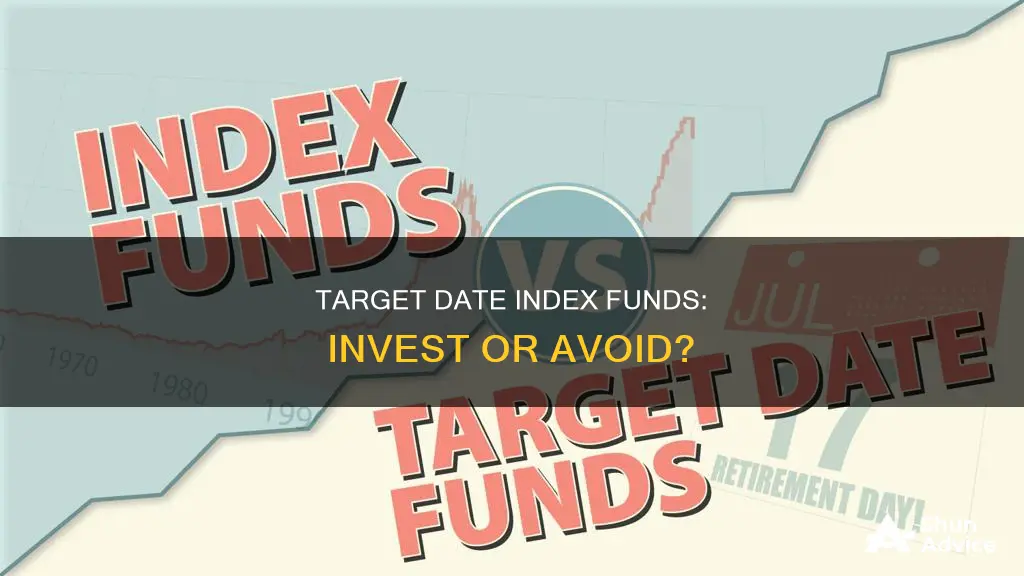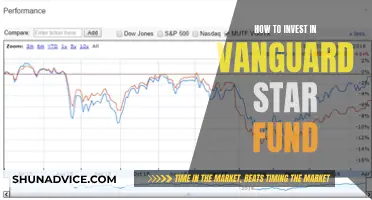
Target-date funds and index funds are two popular options for long-term investing. While both have their merits, there are several factors to consider when deciding which one is right for you. Target-date funds are designed to change their assets over time, becoming more conservative as a target retirement date approaches. They offer a diversified, hands-off approach that is attractive to those who prefer a set it and forget it style of investing. On the other hand, index funds are passively managed mutual funds or exchange-traded funds (ETFs) that track a specific market index, such as the S&P 500, and offer broad exposure to the market at lower costs. When deciding between the two, it's important to consider factors such as investment goals, risk tolerance, and time horizon, as well as the level of engagement desired with your portfolio.
| Characteristics | Values |
|---|---|
| Type of fund | Mutual fund |
| Investment type | Stocks, bonds, other securities, mutual funds, exchange-traded funds (ETFs) |
| Investment strategy | Passive, actively managed |
| Risk | Lowers over time |
| Returns | Varied, but suffered significant losses in 2008 and 2020 |
| Costs and fees | Expense ratios vary, but typically higher than index funds |
| Diversification | High |
| Customisation | Low |
| Control | Low |
| Time horizon | Long-term |
| Tax implications | Tax-efficient in taxable accounts |
| Investor knowledge | Low |
| Investor effort | Low |
What You'll Learn

Target-date funds vs index funds
When it comes to investing for the long term, two options that often come to mind are target-date funds and index funds. While both have their advantages, the right choice depends on your financial goals, risk tolerance, and the level of engagement you want with your portfolio.
Target-Date Funds
Target-date funds are designed to adjust their assets over time, becoming more conservative and less risky as a target retirement date approaches. They offer a diversified, hands-off approach to retirement investing, making them attractive for those who prefer a ""set it and forget it" style. The fund manager handles the allocation and rebalancing of assets, guided by the fund's target date and risk profile. Target-date funds are typically more diversified than broad index funds, investing in a mix of equity and fixed-income assets. As the target date nears, the fund gradually shifts towards more conservative investments like bonds and money market accounts.
Index Funds
On the other hand, index funds are passively managed mutual funds or exchange-traded funds (ETFs) that track a specific market index, such as the S&P 500. They aim to replicate the returns of the underlying index by holding a basket of securities that match its composition and weighting. Index funds offer broad market exposure, lower costs, and simplicity. They are a straightforward, passive approach to investing, eliminating the need to select individual securities. Additionally, index funds provide exposure to a wide range of securities within a single investment vehicle. However, they lack flexibility as they are designed to track a specific index and may not adapt well to changing market conditions.
Comparison
Target-date funds offer a hands-off, all-in-one investment solution, making them ideal for those who prefer simplicity and convenience. They are suitable for investors who want a portfolio that automatically adjusts its asset allocation over time. On the other hand, index funds provide more control over risk and returns, allowing investors to directly invest in different asset classes. Index funds also tend to have lower fees than target-date funds due to their passive management style. However, target-date funds may be preferable for those nearing retirement, as they can help reduce portfolio risk exposure.
In summary, the choice between target-date funds and index funds depends on your investment goals, risk tolerance, and desired level of engagement with your portfolio. Target-date funds offer a hands-off approach with automatic adjustments, while index funds provide broad market exposure and lower costs but require more active management. Both options have their merits, and the decision should be based on your financial objectives and investment style.
Vanguard 529 Plans: Smart Investment for Education Savings
You may want to see also

Advantages of target-date funds
Target-date funds are a great option for those who want a ""set it and forget it" investment style. They are designed to simplify retirement investing and are a good choice for those who prefer a more hands-off approach. Here are some advantages of target-date funds:
Diversification
Target-date funds typically invest in a mix of asset classes, providing broad diversification within a single investment vehicle. They are usually comprised of equity and fixed-income investments. As the target retirement date approaches, the fund will sell equities and buy more conservative assets like bonds and money market accounts. This ensures your risk profile matches your changing needs as you near retirement.
Professional Management
Fund managers handle the allocation and rebalancing of assets in the portfolio, guided by the fund's target date and risk profile. This means you don't have to worry about adjusting your portfolio over time or manually rebalancing your asset allocation.
Simplicity
Target-date funds are easy to understand and require very little financial knowledge. All you need to know is your desired retirement date. They are also a convenient option as they are often offered as a default investment choice in employer-sponsored retirement plans such as 401(k)s.
Easy Diversification
Target-date funds provide a simple way to diversify your investments across multiple securities. They are often more diversified than broad index funds, spreading your investment across multiple securities, both domestic and international.
Handle Rebalancing
As you age, your risk tolerance typically decreases, but it's easy to go for years without adjusting your portfolio. Target-date funds are structured to rebalance automatically, ensuring your asset allocation remains appropriate for your needs.
Franklin India Prima Fund: Worth the Investment Risk?
You may want to see also

Disadvantages of target-date funds
Target-date funds are a popular investment option for those saving for retirement. However, they also have some disadvantages.
Firstly, target-date funds are often too generalised and one-size-fits-all, which can leave investors exposed during unusual economic conditions. For example, they are based on the premise that bonds are always less risky than stocks, which was not the case during the rising inflation and higher interest rates of 2022. Target-date funds also lack allocation to alternative assets that perform well in a rising rate, inflationary environment, such as commodities, managed futures, or long volatility instruments.
Secondly, target-date funds do not consider an investor's holistic wealth circumstances. They use only one variable – the expected retirement date – to guide the construction of the portfolio. However, other assets outside of the fund, such as real estate, insurance policies, and Social Security, should also be considered when designing an appropriate portfolio.
Thirdly, target-date funds can have opaque fee structures. While most have low expense ratios, some have less transparent fee structures, with high fees in their underlying funds and very low or zero fees at the fund-of-fund level. This can be misleading for novice investors.
Fourthly, not all target-date funds are created equal. They differ in terms of expenses, investment style, and holdings, so it's important to compare these before selecting a fund. For example, some funds are made up entirely of index funds and are likely to have lower fees, while others offer active management, with human beings tracking market trends and making choices.
Finally, target-date funds may get too conservative too quickly as the target date approaches, lowering your overall potential return. This could severely hit your potential retirement income, especially if you plan to live for several decades after retirement and need the extra growth provided by stocks.
Lump Sum Mutual Fund Investments: Good Idea or Not?
You may want to see also

How to invest in target-date funds
Target-date funds are a "set it and forget it" retirement savings option. They are designed to adjust the risk level of your portfolio as you age, moving from growth investments to more conservative ones as retirement nears.
Understand the Basics
Know that target-date funds are mutual funds that purchase from other mutual funds (known as a "fund of funds") to build a diverse portfolio. They are designed to be a hands-off, all-in-one investment vehicle. Understand the advantages and disadvantages of target-date funds before investing.
Choose a Target Retirement Date
Your retirement year is typically the "target date" of these funds, and they are usually named in five-year increments. For example, if you are 40 years old and plan to retire at 65, you would choose a target-date fund with the year 2065 in its name.
Decide on a Fund Provider
You can invest in target-date funds through a 401(k) retirement plan, a brokerage account with a fund manager or online broker, or directly from a fund provider like Vanguard, Fidelity, or T. Rowe Price.
Compare Costs and Investment Philosophies
Consider the ongoing fees you'll pay, as these can eat into your total returns. The cost of a mutual fund is known as its expense ratio, expressed as a percentage of your investment. Compare funds' investing philosophies and strategies for dialing down from equities to bonds as you age.
Make Your Investment
Some funds may require a minimum initial investment, which can range from $500 to $3,000 or more. However, some funds will waive the investment minimum if you make monthly deposits to your account.
Monitor Your Investment
While target-date funds are designed to be hands-off, it's important to review your fund's performance at least once a year to ensure it still aligns with your investment goals and risk tolerance. Also, consider how your target-date fund fits with any other investments you hold to avoid overlap in asset classes.
Smaller Companies, Bigger Returns: Investing in Franklin India
You may want to see also

Target-date funds vs mutual funds
When it comes to investing for the long term, two options that often come to mind are target-date funds and mutual funds. Here's a detailed comparison between the two:
Target-date funds are investment funds designed for long-term investing, typically for retirement. The portfolio of a target-date fund is automatically adjusted over time, becoming more conservative as the investor approaches their retirement date or another milestone. These funds offer a diversified, hands-off approach, making them attractive for those who prefer a "set it and forget it" investment strategy. Target-date funds are often included in employer-sponsored retirement plans, such as 401(k) plans, and are a popular choice, with a significant percentage of 401(k) participants investing in them.
On the other hand, mutual funds are a more traditional investment option. Mutual funds pool money from multiple investors and invest it in a variety of securities, such as stocks, bonds, and other assets. Mutual funds are typically actively managed by fund managers who buy and sell investments within the fund to achieve the fund's investment objectives. Mutual funds can invest in a diverse range of assets, including stocks, bonds, and other securities, providing investors with exposure to different sectors and industries.
Advantages of Target-Date Funds:
- Simplicity and Convenience: Target-date funds offer a simple and convenient way to invest for retirement. Investors only need to know their expected retirement date, and the fund automatically adjusts its asset allocation over time, becoming more conservative as retirement approaches.
- Diversification: Target-date funds typically invest in a mix of asset classes, providing broad diversification within a single investment vehicle.
- Professional Management: Fund managers handle the allocation and rebalancing of assets, guided by the investor's target date and risk profile.
Disadvantages of Target-Date Funds:
- Higher Fees: Target-date funds often have higher expense ratios than mutual funds or index funds due to the active management involved in adjusting the asset allocation.
- Lack of Customization: Investors have limited control over the specific holdings and asset allocation, which may not align perfectly with their personal investment preferences.
- One-Size-Fits-All Approach: Target-date funds follow a preset glide path based on the target retirement date, which may not suit every investor's individual risk tolerance and investment goals.
Advantages of Mutual Funds:
- Active Management: Mutual funds are actively managed by fund managers who aim to outperform the market and generate higher returns for investors.
- Diversification: Mutual funds provide investors with exposure to a diversified portfolio of securities, reducing the risk associated with investing in individual stocks or bonds.
- Professional Management: Mutual funds are managed by investment professionals who have the expertise and resources to research and select investments, construct a portfolio, and monitor and adjust it as needed.
Disadvantages of Mutual Funds:
- Fees and Expenses: Mutual funds typically charge various fees, such as management fees, distribution fees, and other operational expenses. These fees can eat into investment returns over time.
- Potential Underperformance: Mutual funds may underperform the market or their benchmark index due to poor investment decisions or market conditions.
- Lack of Control: Investors have limited control over the specific investments made by the mutual fund, as the fund managers make the investment decisions on their behalf.
In summary, target-date funds offer a hands-off, automated investment approach, making them suitable for investors who want a simple, long-term investment strategy. Mutual funds, on the other hand, offer more diverse investment options and are actively managed by professionals. The choice between the two depends on an investor's financial goals, risk tolerance, and desired level of involvement in their investments.
Index Funds: A Smart Investment Strategy for Beginners?
You may want to see also







